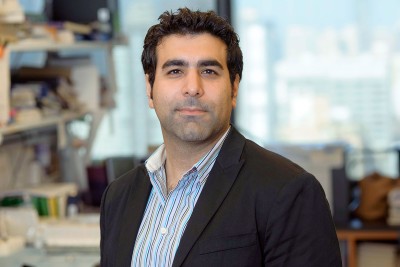
About the Center
The mission of the Center for Molecular Imaging and Bioengineering (CMIB) is to integrate novel molecular imaging methods and state-of-the-art bioengineering tools to revolutionize the way Memorial Sloan Kettering Cancer Center (MSK) approaches cancer research. In uniting these transformational fields, we aim to answer fundamental questions in cancer biology and rapidly translate preclinical discovery into clinical application — ultimately improving cancer prevention, detection, and treatment.
The center is founded on the principle of multidisciplinary translational research and will support faculty from diverse areas pursuing technology-based methods. CMIB encourages collaborative integration across the cutting-edge research environment at MSK, empowering scientists and physicians alike by providing them with the tools necessary to pursue their most challenging ideas.
Our Leadership and Faculty
Under the leadership of biochemist and bioengineer Kayvan R. Keshari, CMIB will promote the expansion and application of technological capabilities, creating a new approach to cancer research and propelling MSK to the forefront of cancer engineering.
To achieve our goals, CMIB will foster deep ties between technology experts and faculty by establishing multidisciplinary teams with diverse but interrelated projects directed toward the common goal of applying molecular imaging and engineering principles to transformative questions — and unmet patient needs — in oncology.
We invite researchers and physicians working in cancer biology, medicine, chemistry, developmental biology, physics, radiochemistry, immunology, genomics, pharmacology, and engineering to join our center.
Internal Advisory Committee
Our internal advisory committee comprises the following MSK leaders:
- Michael Overholtzer, Dean, Gerstner Sloan Kettering Graduate School
- Jason Lewis, Emily Tow Jackson Chair in Oncology
- Hedvig Hricak, Chair, Department of Radiology
- Anna-Katerina Hadjantonakis, Chair, Developmental Biology Program, Sloan Kettering Institute
- Daniel Heller, Head, Cancer Nanotechnology Laboratory, Sloan Kettering Institute
Call to Prospective Members
Our program is open to all members of the MSK community who would benefit from accessing CMIB grants and shared resources. We support the development of new talent by helping to recruit faculty, postdocs, and students with a keen interest in molecular imaging and engineering into various MSK programs.
Pilot Research Grants
To disseminate and cultivate imaging and engineering sciences into cancer biology research at MSK, CMIB sponsors pilot research grants and has established a technology fund to support lab heads and core facilities with acquiring advanced tools and technological resources.
Education and Training Initiatives
CMIB will foster education through several new and established training programs.
The new Gerstner Sloan Kettering (GSK) PhD in Cancer Engineering is a program designed to train the next generation of molecular imaging and bioengineering tool makers fully versed in cancer biology. The first class will matriculate in 2024.
With generous support of the Tow Foundation, CMIB has established graduate and postgraduate fellowships that reflect its focus on translating new discoveries into clinical applications and will help realize its ambitious objectives. The graduate fellowships — undertaken in partnership with Hunter College of the City University of New York (CUNY), all relevant colleges and centers within CUNY, and the Graduate Center-CUNY — support projects at the forefront of science.
The postgraduate fellowships feature a concentration on the complexities associated with the clinical translation of new imaging probes (microscopy, PET, CT, MRI, ultrasound, multimodality, and nanoparticle) in the context of modern oncologic imaging, along with the clinical translation of emerging technologies in cellular therapeutics.
Funded by a National Cancer Institute research training grant (T32 CA254875), the Molecular Imaging in Cancer Biology (MICB) Training Program — led by Jason Lewis, Hedvig Hricak, and Michael Overholtzer — aims to train the next generation of basic scientists to develop cutting-edge diagnostic, prognostic, and therapeutic tools and translate novel molecular imaging methods, technologies, and platforms to better understand human cancer biology. The ultimate goal of the program is to enable trainees to advance the diagnosis, treatment, and management of cancer.
Learn more about our T32 Molecular Imaging in Cancer Biology current fellows.
The City College of New York (CCNY) and Memorial Sloan Kettering Cancer Center (MSK) Partnership is a National Cancer Institute–funded initiative based on mutual cancer research and training objectives in several key areas, including but not limited to basic and applied science, health disparities and cancer burden in underrepresented populations, career development for underrepresented students at all levels, and the reduction of cancer impact in medically underserved communities.
The Molecular Imaging Summer Program (MISP) at MSK offers undergraduate students a 10-week, hands-on research experience in cutting-edge laboratories and the opportunity to interact with research and clinical faculty and trainees. Molecular imaging is one of the most rapidly advancing specialties in medicine, and MSK has established a vibrant, state-of-the-art laboratory-based translational molecular imaging research program.
The Engineering Summer Program (ESP) is designed to bring together undergraduate rising sophomores, juniors, and seniors interested in engineering and biomedicine for a 10-week summer research experience in labs at Memorial Sloan Kettering Cancer Center or Weill Cornell Medicine. Applicants must have a background in engineering, physical sciences, computational, or related fields.
